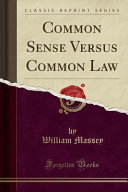

Most ebook files are in PDF format, so you can easily read them using various software such as Foxit Reader or directly on the Google Chrome browser.
Some ebook files are released by publishers in other formats such as .awz, .mobi, .epub, .fb2, etc. You may need to install specific software to read these formats on mobile/PC, such as Calibre.
Please read the tutorial at this link: https://ebookbell.com/faq
We offer FREE conversion to the popular formats you request; however, this may take some time. Therefore, right after payment, please email us, and we will try to provide the service as quickly as possible.
For some exceptional file formats or broken links (if any), please refrain from opening any disputes. Instead, email us first, and we will try to assist within a maximum of 6 hours.
EbookBell Team

4.8
84 reviewsInitial publication: 1850
Excerpt from Common Sense Versus Common Law If Lycurgus could be summoned from the shades to give evidence before a new Common Law Commission, it is not improbable that the illustrious legislator would give a decided opinion against a rash and short-sighted reform of a system, which operates to banish litigation from the courts. "Infatuated men," lie might be supposed to say, "would you destroy a system which has just now reached maturity - a system devised by the wisdom and forecast of your ancestors to counteract the evil tendencies of a corrupt and complicated state of society? Are civil dissension and litigation things to be fostered? If so, simplify your law ; make it intelligible, accessible to the people. About the Publisher Forgotten Books publishes hundreds of thousands of rare and classic books. Find more at www.forgottenbooks.com This book is a reproduction of an important historical work. Forgotten Books uses state-of-the-art technology to digitally reconstruct the work, preserving the original format whilst repairing imperfections present in the aged copy. In rare cases, an imperfection in the original, such as a blemish or missing page, may be replicated in our edition. We do, however, repair the vast majority of imperfections successfully; any imperfections that remain are intentionally left to preserve the state of such historical works.